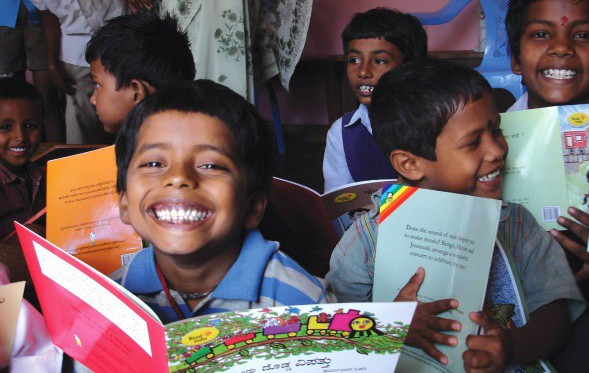The Transformative Power of Education & the Imperative to Educate Our Children Well: Pratham’s Footprint in India

By Dr. Molly Easo Smith, Executive Director, Pratham USA

I grew up knowing my family’s history through repeated narratives by my grandmother. She was, as I came to realize, an incredible woman. My own conviction in the transformative power of education derives directly from her experiences and commitments; my life as an Indian-American who has made the United States her permanent home and my professional life as Executive Director of Pratham USA also derive from my memory of her unfulfilled aspirations.
As was the case for many of her peers in India, my grandmother was married at age twelve, but unfortunately, she was also widowed with two young children by the time she turned eighteen. With six sisters below her yet to be married, my grandmother knew that having been sent off so joyously to her husband’s home only a few years earlier, she had now become a significant burden on her parents.
Too proud to remain thus, she hopped on a train from Kerala in southwestern India to Madras in the southeast. Exchanging the lush surroundings of her family home and all that she knew at the age of eighteen, including her language, she arrived in the dusty and crowded city of Madras (now Chennai), with only the name and address of a woman with whom someone in her village had corresponded, and who was expecting her.
The woman, Mariamma, also a Keralite, was educated, and served as Principal of Presidency College (a primary and secondary school in the city). She lived in a modest four-room house beside the school, and through various connections, adopted several orphan children, bringing them up in her home and providing them with a free education from first grade through high school at her school, attended at the time by those with considerable means. My grandmother joined Mariamma’s household, helping to bring up the children, in return for which, my mother was included among the children and had access to education.
My mother loved school and did well, but she was always conscious among her peers of her fortunate access to an education; after graduation, long though she did to attend college with her friends, she joined the State government and began a career instead. Her closest friend, my godmother, went on to complete her doctorate and became a professor of English in a college in Madras. It was against the likes of her that my mother competed in her imagination as she advanced within the government agency where she worked, rising steadily up the ranks and serving at the highest levels at which she could without a degree.
Through my formative years, the strongest influences on my life were thus my grandmother, who lived with us, and my mother, whose commitment to work outweighed just about everything else. My shaping cultural contexts at home were women who stretched the boundaries of their society, an experience that was reinforced by my education through college in girls-only institutions led by equally imposing and charismatic women. My own search for women role models and enabling women’s success, I suspect, derives from this context.
But the most vivid thing I remember about all these women who shaped my thinking is their love of learning. My grandmother, for example, would wait for me to return from school and then she would work independently on my English homework while I completed my assignments, the circumstance providing her with a context for learning English herself. She loved my textbooks, their vivid pictures and narratives, handling them with a reverence that I never quite appreciated or understood. Of course, she would never work outside the home and had no particular need to know English, factors which made her passion for learning especially poignant in retrospect when I remembered her in later years.
My own work today is thus driven by the memory of her unfulfilled yearning for education; her unrealized aspirations, her firm commitment to ensuring that her daughter received an education, and her instinctive appreciation of self-development, continue to inspire me.
Had she lived in 2012, she would surely have enlisted in one of Pratham’s programs and contributed to Pratham’s success by volunteering in turn to facilitate learning in others. Pratham’s efforts are, by any standards, visionary in their aspirations, transformative in their impact, and meaningful in their accomplishments. Thanks to Pratham, thousands of young children in India have acquired a quality education through their most formative and foundational primary years.
Recently, Pratham has launched initiatives to strengthen secondary education and skills-based vocational training to teenagers and young adults, especially women. As the nation’s largest NGO which began in the slums of Bombay in 1994, Pratham’s impact now stretches through 19 of India’s 28 states, and the organization’s success springs from its visionary leader, an army of volunteers in India, and impassioned supporters in the US, Canada, and the UK.
Philanthropy and volunteerism – powerful drivers of cultural and social transformation – thus define Pratham. And yet, powerful though Pratham’s story might be today, the narrative has only begun and much remains to be done. In the meantime, as Pratham works to transform the cultural and educational landscape of India through its programs and volunteers as well as supporters across the globe, I think often about my grandmother and the dream of personal fulfillment that is now accessible to many who, if Pratham did not exist, would live as she did, with aspirations in their hearts and no means of realizing them. If she were alive today, she would have applauded my commitment to education and admired my work in the U.S. in support of Pratham’s efforts in India.



Mike Byster
As an educator, I believe it is very important to teach material that is important for the future of the students. When inventing my math and memory system Brainetics (http://www.brainetics.com), I wanted to focus on new subjects and innovative methods to teach. By teaching for the 21st century, students will be more prepared in the future. It seems like so many aspects of today’s society centers around the digital environment and teaching should be altered to adapt.
Great article,
Mike Byster
http://www.mikebyster.com
Inventor of Brainetics, Educator, Author of Genius, Mathematician
Liam Styles
Inspiring article! Looking forward to hearing more about Pratham.